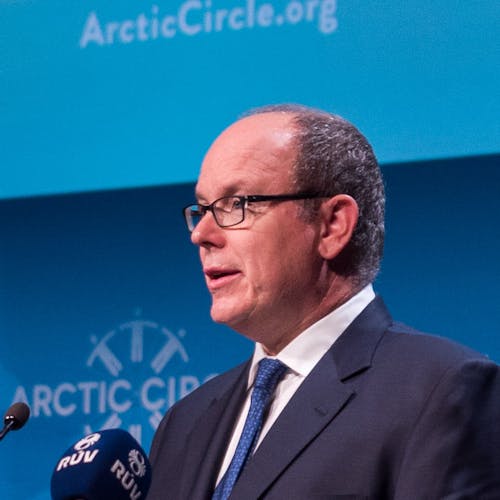What is really new and distinguishes our era from the Cold War is the emergence of information that was then ignored: The need to preserve an environment that we once believed immutable, and which we now know is fragile. And awareness of the importance of these northern ecosystems which are so special for the entire planet, its climate, its biodiversity and its natural balance.
This emergence of the environmental issue is not only an additional part of the Arctic equation; it radically changes the game. Because with these new challenges, the Arctic ceases to be the exclusive concern of the bordering States and the people of which it is composed. It becomes a challenge for the entire human race, for its future, for the future of each one of us.
I believe that is why so many representatives of States, institutions, think tanks, laboratories and companies have joined us today. They are all taking action for the Arctic, for our Planet and its preservation.
Over and above the strategic issues we are familiar with, I think that the challenge before us therefore is to link these matters with broader environmental issues.
And that also means, and above all of course, finding ways of progressing in this specific context.
In this respect, I would like to take this opportunity to make three observations, which outline three ways of addressing this situation:
The first is that the geopolitical challenges encountered by the Arctic since February 2022 are not the only complications faced by environmentalists. Other regions of the world, equally fragile, are caught up in tension and violence. And the majority of the most vulnerable ecosystems are located in countries and regions which, if not at war, suffer from serious social and economic difficulties.
Ecological issues are never “chemically” pure; nearly always they go hand in hand with other difficulties. This should never deter us from moving forward. Action is always possible, even if fragmented, even if restricted. And it is always beneficial. That is why we need to take action wherever we can, however we can. Protecting certain areas against harmful activities, safeguarding a few ecosystems, and limiting the human footprint, if only in certain areas: this is clearly not enough given the magnitude of the issues, but it is always preferable to inaction.
Likewise, we need to continue to support the work carried out by scientists. This is another way to continue to progress, for actions we are implementing today, as well as for actions - hopefully more ambitious - that we will be able to initiate in the future in a peaceful climate. And most importantly, we must remain committed to continuing what is undoubtedly the top priority to ensure an acceptable future for the region: action against global climate change. It is up to each of us, according to his or her own ability, to continue working to this end, because we know that global warming is the greatest threat to the Arctic.
The second observation I would like to make concerns the Indigenous Peoples, who fortunately are represented here, but sadly are not always invited to the fora where the fate of their land is being decided. Yet these people are an essential part of the region’s future. Due to their history and due to the rights they have over it, of course. But also due to their knowledge and their ability to coexist with challenging ecosystems. And also due to the power they need to be given in the future to develop the sound and sustainable management of Arctic resources.
Finally, these people represent a form of continuity which is particularly needed in these troubled times. Continuity beyond borders and the vicissitudes of history, as bloody as that history may be, as closed as these borders may currently be. And continuity between human affairs and the management of natural resources, of which they have deep awareness and knowledge.
That is why it is vital to involve them in international talks concerning the Arctic more often, and to place them at the heart of our discussions whenever they are related to these regions. And that is why, whatever the situation, we need to continue to stand by them, to listen to them, to support them and to help them reclaim the place that always must be theirs.
The third observation I would like to put forward concerns the role that can be played by environmental projects in the current context of this region. And it also concerns the role that these projects could play in view of a resolution of these tensions.
Thanks to the objectivity and comprehensiveness of their work, scientists today represent a unique capacity for dialogue. They are capable of speaking to everyone, and of bearing truths that also concern everyone. Whatever our situation, we are all subject to the same environmental constraints. The war against global warming, against pollution and against species extinction will have no winner if we do not triumph together. That is why, even if it seems complicated sometimes, we have to continue to give a chance to science, to the environment, to these seemingly insignificant struggles that bring us together.



